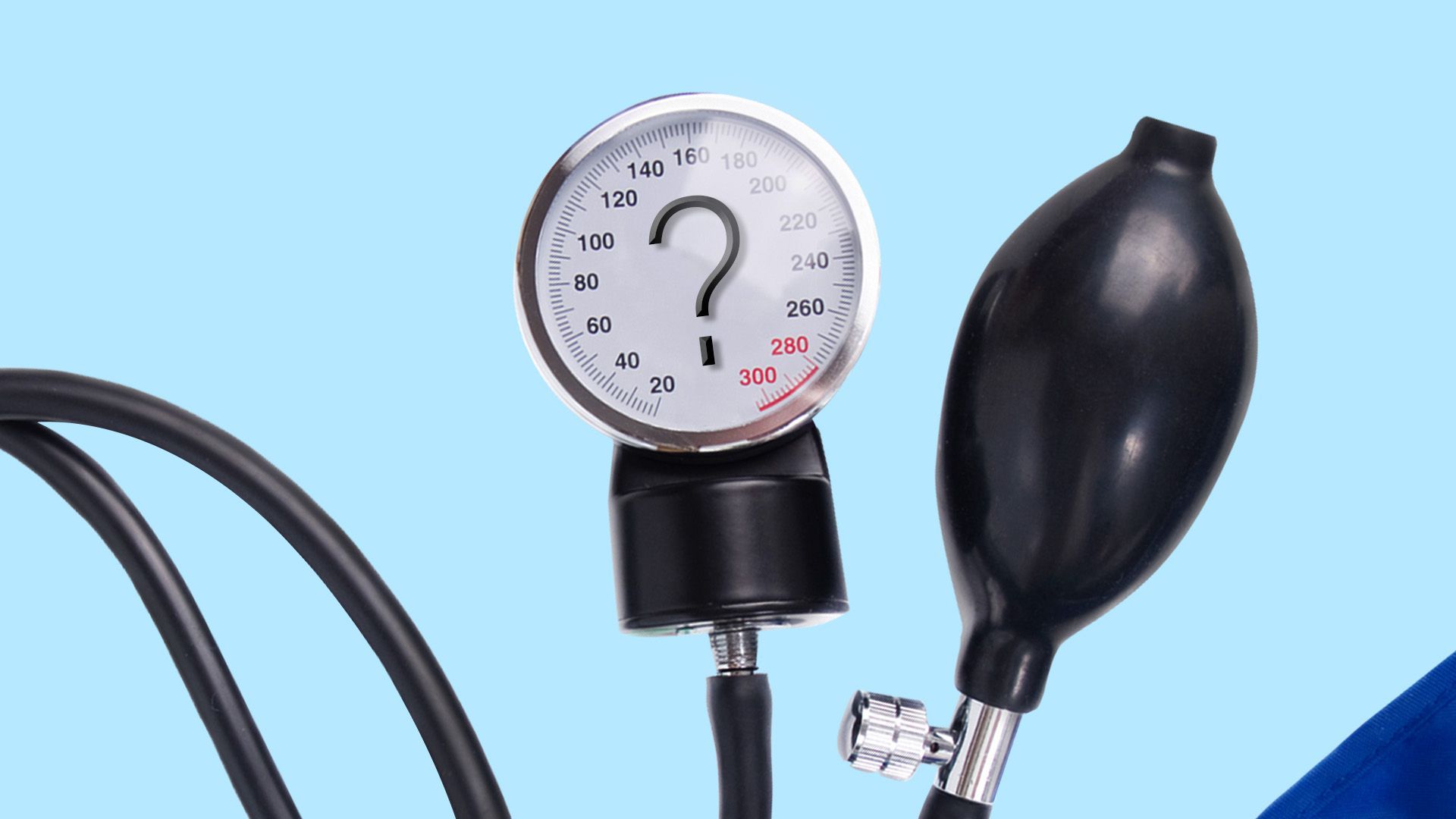| | | | | | | Presented By Upside | | | | Axios What's Next | | By Jennifer A. Kingson, Joann Muller and Alex Fitzpatrick · Dec 14, 2022 | | If you're feeling a little stressed out this holiday season — and who isn't? — Jennifer has some good news today: Everyday stress doesn't immediately translate to hypertension, depending on how we deal with it. - Join us on March 29 in Washington, D.C., for our second annual What's Next Summit — Axios' crystal ball illuminating the innovations, trends and people that are breaking boundaries and shaping our world. Request an invite to attend here.
Today's newsletter is 1,098 words ... 4 minutes. | | | | | | 1 big thing: Rethinking stress and high blood pressure |  | | | Illustration: Natalie Peeples/Axios | | | | Your hectic job, difficult marriage, rebellious children and dwindling bank account? They're probably not raising your blood pressure in a medically meaningful way, according to the latest research, Jennifer A. Kingson reports. - Rather than everyday stressors, the real culprits are genetics and poor habits that are often linked to stress, such as overeating, smoking and hitting the bottle.
- Commonly prescribed regimens — such as stress reduction, biofeedback and relaxation techniques — aren't effective in lowering blood pressure in ways that confer health benefits.
Why it matters: Nearly half of U.S. adults have hypertension (high blood pressure), and only 24% of those diagnosed have it under control, per the Centers for Disease Control and Prevention. Driving the news: While studies have shown population-wide blood pressure elevation during the highly stressful COVID-19 pandemic, the rises were modest, doctors say, and likely related to people getting less exercise, eating poorly, drinking too much and seeing their doctors less often. - "Our expectation was much worse," says Hiroshi Gotanda, an internist at Cedars-Sinai Medical Center in Los Angeles who led a large-scale study of hypertension during the height of the pandemic.
- His study showed that patients measured their blood pressure less often during the first eight months of the pandemic, and that their readings were slightly higher than before the outbreak.
- But the differences were "smaller than expected, probably because of home blood-pressure monitoring and telemedicine," says Gotanda.
Many patients actually saw their blood pressure readings improve during the pandemic — probably because they weren't consuming as many salty restaurant meals, says Samuel Mann, a hypertension specialist at Weill Cornell Medicine in New York. - It's a "medical myth" that chronic stress causes hypertension — job stress in particular, says Mann, who reviewed dozens of studies on the topic and found no meaningful correlation.
- "Yes, stress and emotional distress can transiently increase anyone's blood pressure," Mann writes in a new book, "Hidden Within Us: A Radical New Understanding of the Mind-Body Connection."
- "However, decades of mind-body research have failed to confirm that they cause sustained hypertension or that stress reduction and relaxation techniques can lead to sustained blood pressure lowering."
Yes, but: The medical community still hasn't completely dispelled the stress-blood pressure link. - "Increased psychosocial stress" during the pandemic may have impeded chronic hypertension management, per Gotanda's study.
- A separate study on blood pressure levels during the pandemic, led by Luke Laffin of the Cleveland Clinic, reached similar conclusions — and also cited "emotional stress" as a possible factor.
- The American Heart Association notes that the link between stress and high blood pressure "is still being studied."
New theory: While everyday stress doesn't cause chronic hypertension, repressed emotions — from childhood upheavals and other traumas — sometimes can, Mann writes in his new book. - "I'm introducing the concept of repressed emotions and their effects on our health, a concept that doesn't yet exist in medicine," he tells Axios.
- His conclusions come from decades of interviews with patients who have hard-to-explain hypertension, who described severe traumas in their lives (from losing a child to surviving the Holocaust) yet remained upbeat.
- Repressed emotions, whether or not we're aware of them, can cause hypertension, migraines, chronic fatigue syndrome and other conditions, Mann contends.
The bottom line: A healthy diet combined with regular exercise and good sleeping habits can control or avert hypertension, doctors say. Share this story. |     | | | | | | 2. Getting closer to "limitless clean energy" |  | | | Inside a support structure at NIF. Photo: Damien Johnson/Lawrence Livermore National Lab | | | | A fusion reactor has for the first time produced more energy than required to start the reaction in the first place, U.S. officials announced Tuesday, Axios' Alison Snyder reports. Why it matters: Scientists have worked for six decades to develop nuclear fusion as a source of effectively limitless clean energy. Driving the news: On Dec. 5, the National Ignition Facility (NIF) at the federal Lawrence Livermore National Laboratory achieved "ignition," in which a fuel is ignited and continues burning on its own. How it works: The NIF's fuel is made up of deuterium and tritium inside a polished diamond spherical capsule placed in a hollow container. - 192 high-energy lasers converge on the capsule, compressing the fuel and, for a moment, simulating the conditions inside a star.
- The researchers produced just over 3 megajoules of energy after putting in only 2.
- It is "a scientific milestone... and also an engineering marvel beyond belief," U.S. Office of Science and Technology Policy director Arati Prabhakar said.
Yes, but: Big scientific, technical and financial hurdles remain. - "Can we begin to make this process easier and more repeatable? Can we begin to do it more than one time a day?" Lawrence Livermore National Lab director Kim Budil said.
|     | | | | | | 3. Axios Power Player: Carla Hayden |  | | | Photo: Shawn Miller/Library of Congress | | | | Librarian of Congress Carla Hayden is making libraries across the country cool again — but especially in her city of Washington, D.C. Why it matters: Hayden's modernization efforts are pushing libraries everywhere to evolve and meet today's readers. The cool factor: Hayden tweeted about the Library of Congress' flute collection this fall and tagged pop superstar and flutist Lizzo. - Lizzo — an Axios Houston Power Player herself — saw the message and wound up playing James Madison's 200-year-old crystal flute days later.
Axios Local reporters made Power Player selections based on their own expertise, a reader poll and interviews with influential people. Read all the profiles here. |     | | | | | | A message from Upside | | This app is helping users treat themselves | | |  | | | | Upside is on a mission to make sure that, even during expensive times, people still have a little extra money for a rainy day fund. The free app gets users cash back on: - Gas.
- Groceries.
- Convenience stores.
- Restaurants.
On average, users earn $148 annually. Download the free Upside app to start earning. | | | | | | 4. 📸 Solar-powered train |  | | | Photo: David Mareuil/Anadolu Agency via Getty Images | | | | A railway worker inspects a solar-powered train car in Tokorozawa, Japan. - The "Leo Liner" runs for about 2 miles, connecting Tokyo with Tokorozawa, and is powered entirely by energy produced at a nearby solar facility.
Japan, which has some of the world's most-used rail networks, is working to decarbonize its trains. - One operator, Tokyu Railways, completed its transition to renewable energy sources earlier this year.
- Japanese officials are also mulling nuclear power's role in the country's clean energy future — a difficult sell for some residents, with memories of the 2011 Fukushima disaster still fresh in many minds.
|     | | | | | | 5. Can "Avatar" save the box office? |  Data: The Numbers; Chart: Axios Visuals The highly anticipated Avatar sequel "The Way of Water" is expected to dominate this week's box office when it hits theaters Friday, Axios' Sara Fischer and Tim Baysinger report. Why it matters: The movie "is under tremendous pressure to deliver the goods, reinvigorate late-year moviegoing and give [director James] Cameron the de facto green light for the future planned installments of this mega-high-profile movie brand," said Comscore senior media analyst Paul Dergarabedian. Details: The Disney flick is expected to bring in over $150 million domestically this weekend, which would make it one of the year's best openers. The big picture: Movie theaters struggled to fully recover from the pandemic this year, but analysts are hopeful they will improve next year and beyond. |     | | | | | | A message from Upside | | How to fight inflation with your everyday spending | | |  | | | | The Upside app pays you back a little from each purchase to help offset rising costs. On average, users earn $148 annually. You can get cash back at: - Gas stations.
- Convenience stores.
- Grocery stores.
- Restaurants.
Take back control of your budget and download the free Upside app. | | | | Big thanks to What's Next copy editor Amy Stern. Was this email forwarded to you? Get your daily dose of What's Next by signing up here for our free newsletter. |  | | Are you a fan of this email format? Your essential communications — to staff, clients and other stakeholders — can have the same style. Axios HQ, a powerful platform, will help you do it. | | | | | | Axios thanks our partners for supporting our newsletters. If you're interested in advertising, learn more here.
Sponsorship has no influence on editorial content. Axios, 3100 Clarendon Blvd, Arlington VA 22201 | | | You received this email because you signed up for newsletters from Axios.
Change your preferences or unsubscribe here. | | | Was this email forwarded to you?
Sign up now to get Axios in your inbox. | | | | Follow Axios on social media:    | | | | | |









No comments:
Post a Comment